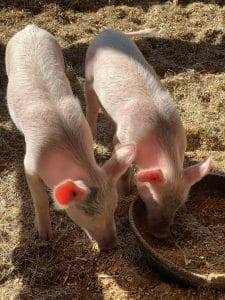Pig Farming in Nigeria: The Ultimate Guide
Views: 2
Pig Farming in Nigeria: When most people think about farming in Nigeria, pigs aren’t usually the first animals that come to mind. But behind the scenes, pig farming is quietly becoming one of the most lucrative and scalable agribusinesses in the country. With high demand for pork, fast-growing breeds, and relatively low startup costs, more entrepreneurs are turning to piggery as a serious money-maker.
Whether you’re just getting started or looking to level up an existing farm, pig farming offers a clear path to consistent income—if you know what you’re doing. From choosing the right breeds to managing feed and health, success in this field comes down to strategy, commitment, and smart decision-making.

Whether you’re a beginner or an experienced agricultural entrepreneur, this guide will provide valuable insights and actionable tips to help you plan, start, and scale your pig farming business in Nigeria.
In this blog, we’ll explore:
- Planning Your Pig Farm
- Selecting Suitable Pig Breeds and Stocking Your Farm
- Establishing Feed and Nutrition Programs
- Implementing Effective Pig Health Management
- Marketing and Selling Your Pigs
Why Pig Farming in Nigeria?
Pig farming in Nigeria has exploded in popularity over the past decade—and for good reason. The demand for pork and pork-based products is steadily rising, especially in urban centers where consumption rates are high. Restaurants, hotels, and supermarkets are constantly looking for fresh, quality pork, making it a high-demand market with room for more suppliers.
One of the biggest advantages is the relatively low startup cost compared to other types of livestock farming. You don’t need expensive machinery or massive land to get started. With smart planning and the right setup, even small-scale farmers can turn a profit quickly.
Another major win? Pigs grow fast and reproduce in large numbers. A single sow can give birth to 8–12 piglets per litter and up to two litters per year. That means more pigs to sell, more income, and faster scaling.
Revenue streams also go beyond just selling pork. Pig farmers can make money from breeding, selling piglets, producing organic fertilizer from pig waste, and even processing pork into bacon, sausages, or smoked meat.
Still wondering how profitable is pig farming in Nigeria? With proper feeding, disease control, and marketing, return on investment can reach up to 200% within six to eight months. For anyone looking to break into agribusiness with real profit potential, pig farming is easily one of the smartest moves you can make.
Also read
Business Ideas in Nigeria: Top Opportunities
How Many Months Does a Pig Take to Mature?
Pigs typically take 5 to 8 months to mature, depending on the breed and feeding quality. This quick turnaround makes pig farming super attractive for investors and farmers aiming for fast profits.
Planning Your Pig Farm
Jumping into pig farming without a solid plan is a fast track to failure. Proper planning helps you avoid costly mistakes and sets the foundation for a profitable, scalable operation.
1. Identify Your Market1. Identify Your Market
Before building anything, figure out who you’re selling to. Your target market could include:
Restaurants and hotels with high pork demand
Butchers and meat shops
Local markets and wholesalers
Direct-to-consumer (DTC) sales through social media or farm outlets
Understanding your market helps you decide the size of your farm, pricing strategy, and even which pig breeds to rear. It also determines the form of pork you’ll focus on—live pigs, processed meat, smoked pork, or piglets.
2. Create a Business Plan
A strong business plan is your game plan. It should cover:
Startup budget: Land, pigs, feed, equipment, and labor costs
Operational costs: Feed, vet services, maintenance, and marketing
Revenue targets: Based on market prices and your farm’s output
Risk management: How you’ll handle disease outbreaks, feed shortages, or market fluctuations
Include a realistic timeline for reaching break-even and profit points. This roadmap keeps you focused and is essential if you’re seeking funding.
3. Secure Funding
Starting pig farming in Nigeria isn’t overly expensive, but it still needs capital. Explore funding options like:
Bank loans or cooperative financing
Government agricultural grants or intervention programs
Partnerships or investor backing
Personal savings or crowdfunding if starting small
Always start with what you can manage—then scale as profits grow.
4. Acquire Land and Infrastructure
Your location plays a major role in your farm’s success. Look for land that’s:
Accessible by road (for transporting pigs and supplies)
Close to feed suppliers, veterinary services, and markets
Well-drained and not prone to flooding
Spacious enough for future expansion
How much space do you need for 1000 pigs? You’ll need at least 1 to 2 acres, factoring in:
8–10 square meters per pig to avoid stress and disease
Separate pens for sows, piglets, boars, and grower pigs
Areas for feeding, waste disposal, and isolation of sick animals
Room for equipment storage and staff quarters (if needed)
Proper layout and spacing improve hygiene, reduce disease outbreaks, and keep your pigs growing healthy and fast.
5. Plan for Waste Management
Pig farms generate a lot of waste, so your plan must include an eco-friendly disposal system. Consider:
Manure pits or digesters for converting waste to biogas or compost
Drainage systems to prevent waterlogging
Odor control measures like regular cleaning and planting trees around the farm
Poor waste handling can attract pests, create health hazards, and damage your farm’s reputation—don’t skip this step.
How much space do you need for 1000 pigs? You’ll need around 1 to 2 acres minimum, with proper waste management and spacing (around 8–10 sq meters per pig) to avoid overcrowding and disease.
Planning Your Pig Farm
Before you jump into pig farming, proper planning is crucial. Here are some key considerations to lay a solid foundation:
1. Identify Your Market
Understand your target audience. Restaurants, hotels, wholesalers, and individual consumers are potential buyers. Research their preferences and determine the size of your customer base. This knowledge will guide your production scale and marketing strategies.
2. Create a Business Plan
A detailed business plan outlines your goals, marketing strategies, financial projections, and operational processes. It serves as your roadmap and helps you stay focused. Seek advice from agricultural professionals or experienced farmers to refine your plan.
3. Secure Financing and Resources
Starting a pig farm requires capital for land, infrastructure, feed, and livestock. Explore funding options like loans, grants, or partnerships. Efficiently manage your resources to ensure financial sustainability throughout your farming journey.
4. Acquire Land and Infrastructure
Choose a location with access to transportation, veterinary services, and feed suppliers. Ensure the land has utilities like water and electricity. Build spacious, ventilated pig pens to provide a clean and comfortable environment for your pigs.
5. Implement Waste Management Systems
Proper disposal of pig waste is essential for maintaining a healthy and pollution-free environment. Invest in systems that convert waste into valuable by-products like organic fertilizer.
Selecting Suitable Pig Breeds and Stocking Your Farm
Your choice of pig breeds significantly impacts your farm’s productivity and profitability.
1. Evaluate Suitable Pig Breeds
Popular pig breeds in Nigeria include:
- Large White: Known for fast growth and high-quality meat.
- Landrace: Adaptable and highly prolific.
- Duroc: Durable with lean meat production.
Choose breeds that align with your farming objectives and market demand.
2. Source High-Quality Stock
Purchase piglets from reputable breeders or start your own breeding program. Ensure they are disease-free, genetically superior, and adapted to the Nigerian climate. Conduct thorough health checks before introducing them to your farm.
3. Manage Breeding and Health
Implement effective breeding practices like artificial insemination or natural mating. Maintain a vaccination schedule and prioritize hygiene to prevent diseases.
Establishing Feed and Nutrition Programs
Proper feeding is the backbone of a successful pig farming business.
1. Understand Nutritional Needs
Pigs require a balanced diet of protein, energy, vitamins, and minerals at different growth stages. Consult with nutrition experts to create an effective feed formulation.
2. Source and Formulate Feed
Purchase high-quality feed or produce your own using ingredients like maize, soybeans, and cassava peels. Regularly assess the quality to avoid contamination or nutritional deficiencies.
3. Optimize Feeding Schedules
Set consistent feeding times and monitor feed intake. Avoid overfeeding or underfeeding to maximize growth and minimize waste.
4. Explore Cost-Effective Alternatives
Supplement commercial feed with agricultural by-products, crop residues, or food waste. Ensure these alternatives are safe and nutritionally adequate.
Implementing Effective Pig Health Management
Healthy pigs are the cornerstone of a profitable pig farming business.
1. Prevent Diseases
Adopt strict biosecurity measures to prevent the spread of diseases. This includes controlling farm access, disinfecting regularly, and quarantining new pigs.
2. Develop a Vaccination Schedule
Work with a veterinarian to create a tailored vaccination plan. Protect your pigs against common diseases like African Swine Fever and Porcine Respiratory Diseases.
3. Consult with Experts
Engage with veterinarians and attend workshops to stay updated on best practices in pig health management.
Marketing and Selling Your Pigs
The final step in pig farming is turning your hard work into profit.
1. Identify Buyers and Channels
Explore partnerships with wholesalers, retailers, restaurants, and hotels. Use social media platforms to reach individual consumers. Attend agricultural fairs to network and showcase your farm.
2. Highlight Your Farm’s Unique Selling Points
Emphasize the quality of your pigs, sustainable farming practices, and traceability. Use high-quality photos and videos in your marketing campaigns.
3. Negotiate Prices
Understand market trends and set competitive prices. Build long-term relationships with buyers to secure steady sales.
Final Though on Pig Farming in Nigeria
Starting a pig farming business in Nigeria is a rewarding venture with immense potential for growth. By carefully planning, selecting the right breeds, ensuring proper feeding, maintaining good health practices, and implementing effective marketing strategies, you can create a profitable and sustainable pig farming operation.
Remember, success in pig farming requires patience, continuous learning, and adaptability. Embrace the challenges, stay committed to best practices, and prioritize the health of your pigs. With determination and hard work, your pig farming journey can be incredibly fulfilling.
Good luck!
Frequently Asked Questions (FAQ) on Pig Farming in Nigeria
How Profitable is Pig Farming in Nigeria?
Pig farming is highly profitable in Nigeria due to the high demand for pork and the relatively low cost of feeding pigs. With proper management, farmers can achieve up to 200% return on investment within six months. The profitability also comes from multiple revenue streams, including the sale of pork, manure, and other pig by-products.
What is Piggery Farming in Nigeria?
Piggery farming refers to the practice of raising pigs for commercial purposes in Nigeria. This includes the breeding, rearing, and selling of pigs and pork products. It’s an agricultural venture with immense potential, catering to local and international markets.
What is the State of Pig Production in Nigeria?
Pig production in Nigeria is growing rapidly due to increasing demand for pork and government support for agricultural initiatives. The industry is seeing advancements in breeding techniques, feeding strategies, and disease management, making it a lucrative sector for investors.
What is Pig Farming in Nigeria?
Pig farming in Nigeria involves raising pigs for meat, breeding, or by-products. It is a growing sector with high profitability and a strong market demand. Farmers can rear pigs on small, medium, or large scales depending on their resources and business goals. How Can I Start a Pig Business in Nigeria?
Starting a pig business in Nigeria involves steps such as conducting market research, acquiring land, building pig pens, selecting high-quality breeds, feeding the pigs properly, and marketing your products. With the right planning and execution, a pig business can be a highly rewarding venture.
What Does a Piggery in Nigeria Look Like?
A piggery in Nigeria typically consists of pens or housing units where pigs are reared. These structures should be spacious, well-ventilated, and hygienic to ensure the pigs’ health and productivity. Most pig farms also have feeding areas, water troughs, and storage facilities for feed.
What are the Common Types of Pigs in Nigeria?
The common types of pigs reared in Nigeria include:
- Large White: Known for its high growth rate and good meat quality.
- Landrace: A prolific breed suitable for commercial farming.
- Duroc: Popular for its durability and lean meat.
- Hampshire: Valued for its excellent meat production.
Farmers typically choose breeds based on their climate, feeding resources, and market preferences.


